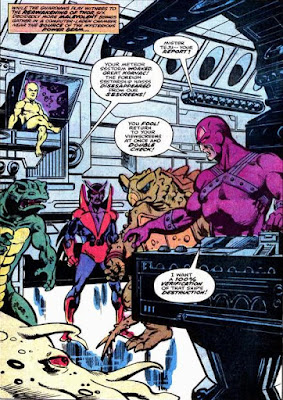One of the things I've learned since becoming an amateur comic blogger is that there were a lot more non-Legion heroes and teams in DC's 30th century than I realized. (In addition to the Heroes, there was the Legion of Subs, The Uncanny Amazers, and the subject of the present series: The Wanderers.)
The Beginning of the Wanderers' Journey
Originally created by Jim Shooter and Win Mortimer, the original Wanderers (Quantum Queen, Psyche, Ornitho, Immorto, Dartalg, Elvo, and their leader Celebrand) first appeared in Adventure Comics #375 (DEC 1968). Interestingly, they were introduced as having been in existence prior to the Legion of Superheroes; and, in fact, to have been around long enough to have developed a respected reputation by the time the Legion met them. (Comicvine)
The Beginning of the Wanderers' Journey
Originally created by Jim Shooter and Win Mortimer, the original Wanderers (Quantum Queen, Psyche, Ornitho, Immorto, Dartalg, Elvo, and their leader Celebrand) first appeared in Adventure Comics #375 (DEC 1968). Interestingly, they were introduced as having been in existence prior to the Legion of Superheroes; and, in fact, to have been around long enough to have developed a respected reputation by the time the Legion met them. (Comicvine)
I guess the thing that was originally intended to set the Wanderers apart--as their name suggests--was that they were not stationary, but ranged (or "wandered") about the galaxy fighting evil. They fit into the "masterless ronin" hero type.
Though I can't prove it, I suspect the earlier success of two movies may have been a direct contributor to the creation of the Wanderers. In 1954 legendary filmmaker Akira Kurasawa released his movie The Seven Samurai. The "samurai" in this case were actually ronin, a term that more specifically meant they were "masterless samurai." Wikipedia proclaims the movie, "one of the most remade, reworked, referenced films in cinema."
In America, it only took six years before John Sturges released a Westernized version of the story, The Magnificent Seven, which was equally-successful in its own right. Flash forward another eight years, then, and Shooter/Mortimer bring us the tale of seven, wandering heroes (i.e., ronin) going about the galaxy righting wrongs. Indeed, it's interesting that when Shooter and Mortimer introduce the Wanderers, they do so with the implication that these aren't new heroes...that, in fact, they pre-dated the establishment of the Legion of Superheroes itself!
Though I can't prove it, I suspect the earlier success of two movies may have been a direct contributor to the creation of the Wanderers. In 1954 legendary filmmaker Akira Kurasawa released his movie The Seven Samurai. The "samurai" in this case were actually ronin, a term that more specifically meant they were "masterless samurai." Wikipedia proclaims the movie, "one of the most remade, reworked, referenced films in cinema."
In America, it only took six years before John Sturges released a Westernized version of the story, The Magnificent Seven, which was equally-successful in its own right. Flash forward another eight years, then, and Shooter/Mortimer bring us the tale of seven, wandering heroes (i.e., ronin) going about the galaxy righting wrongs. Indeed, it's interesting that when Shooter and Mortimer introduce the Wanderers, they do so with the implication that these aren't new heroes...that, in fact, they pre-dated the establishment of the Legion of Superheroes itself!
If my math is correct (and excluding reprints), the original Wanderers appeared in only five issues:
Next week, we'll kick things off by looking at the Wanderer's original leader, Celebrand and (hopefully) their debut in Adventure Comics #375.
- Adventure Comics #375 (DEC 1968)
- Adventure Comics #376 (JAN 1969)
- Superboy #200 (JAN 1974)
- Legion of Superheroes #294 (DEC 1982)
- Legion of Superheroes #300 (JUN 1983)
Next week, we'll kick things off by looking at the Wanderer's original leader, Celebrand and (hopefully) their debut in Adventure Comics #375.



















